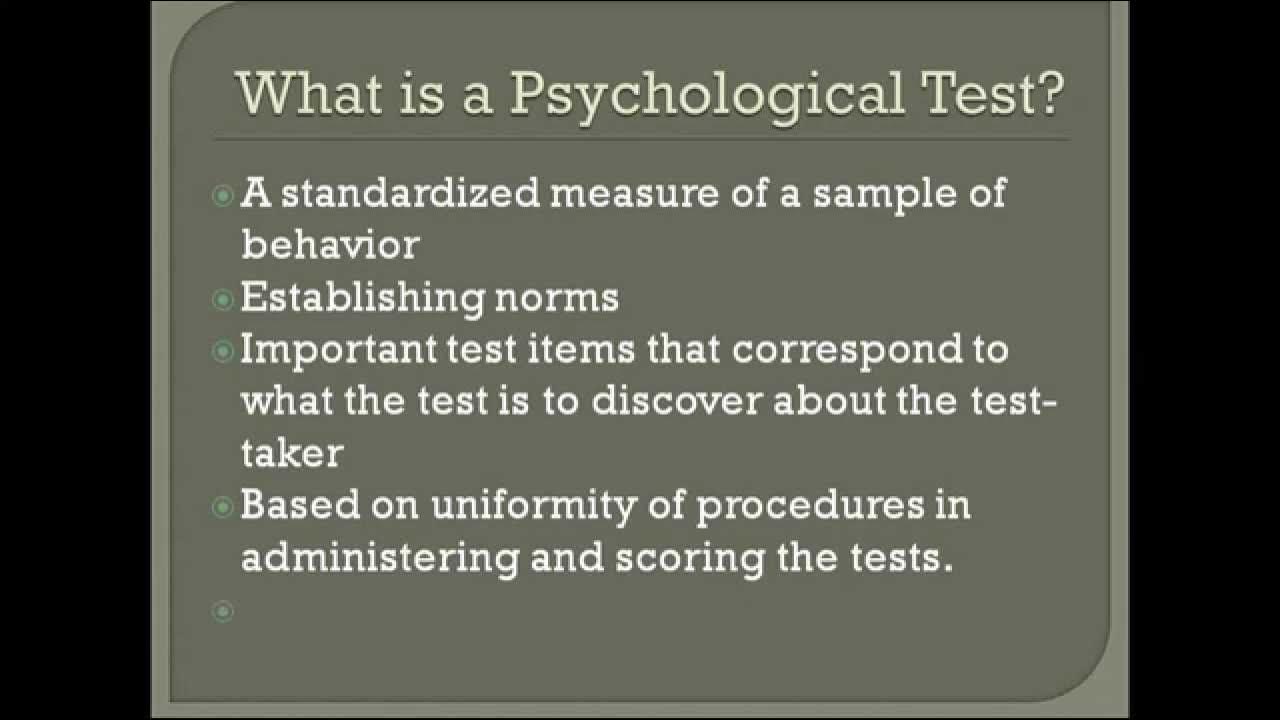PAUP Pengukuran Psikologis
Summary
TLDRThis lecture introduces the concept of psychological measurement, focusing on psychological testing as a standardized process to assess cognitive, emotional, behavioral, and interpersonal attributes. The session distinguishes between psychological tests and assessments, highlighting differences in complexity, duration, and data sources. It also explores the foundational elements of psychological testing, such as its systematic nature, behavior sampling, and scoring systems. The course aims to create a psychological scale, specifically a behavioral attitude scale, involving non-cognitive aspects, with a focus on ensuring validity and reliability in the measurement process. Key tools like personality and interest scales are also covered.
Takeaways
- 😀 Psychological measurement involves using standardized procedures to assess cognitive, emotional, behavioral, and interpersonal attributes.
- 😀 Psychological tests are used to measure specific attributes like anxiety or stress, while assessments are more complex and involve multiple data sources.
- 😀 Psychological testing can be categorized into 'measured' (tests, questionnaires) and 'non-measured' (interviews, observations) types.
- 😀 The defining elements of psychological testing include systematic procedures, behavior sampling, relevant measurement of cognitive or emotional functions, evaluable scores, and empirical data evaluation.
- 😀 Psychological tests focus on measuring a small aspect of behavior, as the time available for testing is often limited.
- 😀 The main difference between psychological tests and assessments is that tests are simpler, focused on one attribute, and provide quantitative results, while assessments are complex and can include both subjective and objective data.
- 😀 Psychological tests are typically short, can be completed in minutes to hours, and are relatively inexpensive, while assessments can take days and are often costly due to the involvement of professionals.
- 😀 The purpose of psychological testing is often to evaluate knowledge or specific abilities, while assessments are used for broader goals like diagnosis or understanding complex behavior.
- 😀 A psychological scale is a tool designed to measure non-cognitive aspects, such as aggressiveness or happiness, through items that generate quantifiable scores.
- 😀 The semester project involves creating an attitude scale, which will require considering reliability, validity, and psychometric analysis.
Q & A
What is psychological measurement?
-Psychological measurement refers to the standardized process used to assess and quantify various psychological attributes such as cognitive abilities, emotions, behaviors, and interpersonal skills. This is often done through psychological tests.
How does psychological testing relate to theoretical frameworks?
-Psychological testing is based on a specific theoretical framework that guides the measurement of attributes such as cognition, emotion, behavior, and interpersonal relationships, ensuring the assessment is both structured and meaningful.
What is the difference between measured and non-measured psychological assessments?
-Measured psychological assessments involve responses that are scored based on right or wrong answers, such as in psychological tests. Non-measured assessments, like interviews or observations, cannot be scored in the same way.
What are the defining elements of psychological testing?
-The defining elements of psychological testing include being a systematic procedure, sampling relevant behavior, ensuring the relevance of the behavior being assessed, having evaluable outcomes with numerical scoring, and applying standards based on empirical data.
How does a psychological test differ from a psychological assessment?
-A psychological test is simpler, often focused on a single dimension, and uses objective measurements. A psychological assessment is more complex, involves multiple procedures, and may consider data from various sources such as interviews and observations.
What is the difference in duration between psychological tests and assessments?
-Psychological tests are typically shorter, taking minutes to a few hours, while psychological assessments can take longer, ranging from hours to days.
How do the data sources in psychological tests and assessments differ?
-In psychological tests, the primary data source is the respondent or subject. In psychological assessments, the data can come from multiple sources, including the subject, family, teachers, and other observers.
Why is objectivity important in psychological testing?
-Objectivity is crucial in psychological testing because the results need to be quantified and interpreted consistently. This ensures that the test is reliable and that the results are not influenced by personal bias.
What is a psychological scale, and what is its purpose?
-A psychological scale is a tool used to measure non-cognitive aspects such as aggression or happiness. It consists of items that assess behavior and produces scores that can be quantified. The goal is to either diagnose or predict future behavior.
What are the different types of psychological scales mentioned in the transcript?
-The transcript mentions several types of psychological scales, including personality scales, interest scales, attitude scales, and behavior scales. Each type measures different aspects of an individual's psychology, such as their preferences, tendencies, and actions.
Outlines

This section is available to paid users only. Please upgrade to access this part.
Upgrade NowMindmap

This section is available to paid users only. Please upgrade to access this part.
Upgrade NowKeywords

This section is available to paid users only. Please upgrade to access this part.
Upgrade NowHighlights

This section is available to paid users only. Please upgrade to access this part.
Upgrade NowTranscripts

This section is available to paid users only. Please upgrade to access this part.
Upgrade NowBrowse More Related Video

Psikometri 3_Sejarah Pengukuran 1

Dimensi Keperilakuan, Indikator dan Blueprint

Копинг и психологическая защита — Екатерина Битюцкая / ПостНаука

Psychological Tests Explained

Behavior Description Interview: Teknik Wawancara dalam Asesmen Psikologi

Qual a diferença entre Avaliação Psicológica e Testagem Psicológica?
5.0 / 5 (0 votes)